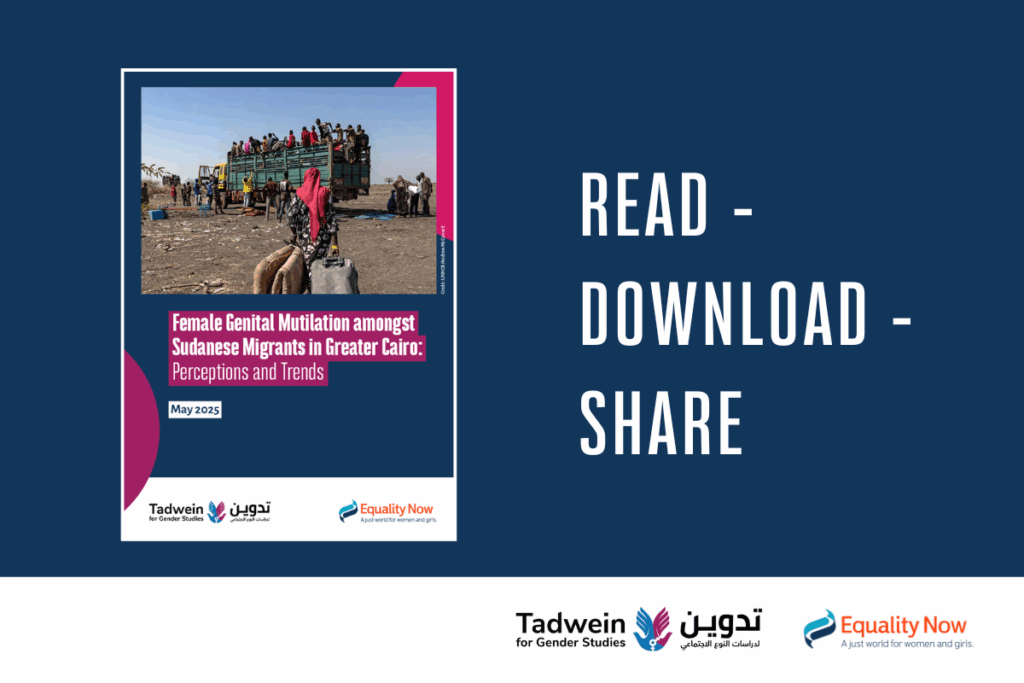How does transition affect harmful practices? This report was developed with Tadwine for gender studies and examines the experiences and attitudes of Egyptian Sudanese immigrants regarding female genital mutilation (FGM). Despite legal bans in both countries, FGM persists due to established beliefs, misinformation, and lack of knowledge about the impact of FGM, and lack of social pressure from community networks.
What is in the report?
This qualitative study is revealed based on interviews with Sudanian parents, young people and elders who live in Cairo and Governor Giza, Egypt.
The role of immigration in the maintenance, reshaping, or disruption of FGM practices how cultural terms such as “Sunna” FGM (see Type 1 FGM) increase the acceptance of practices in the misinformation and gaps behind key gender and decisions around FGM.
For who is it?
Policymakers in Egypt and the Middle East and Africa are dealing with FGM in immigrant communities seeking evidence-based entry points.
Important findings
This study provides rare and qualitative insight into how Egyptian FGM is understood and practiced among Sudanese immigrants. Based on in-depth interviews with 30 participants from the Sudanese community in Greater Cairo, the key findings are as follows:
A broad perception, but unclear understanding of FGM types:
All women can use local terms (“SUNNA”, “sandwich”, “faraonic”) to identify the form of FGM, but they misunderstand that “SUNNA” (type I) in particular is harmless or acceptable.
Transitions rarely shift only entrenched beliefs:
Sudanese families who practiced FGM in Sudan could continue doing so in Egypt. Those who stopped before moving are unlikely to restart. Transitions do not essentially change behavior. The community impact remains strong. However, the economic difficulties caused by the humanitarian crisis and the need to provide necessities such as housing and food have contributed to the delay and cancellation of FGM.
The “small Sudan” network maintains FGM:
The Cairo and Giza immigrant hub (known as “little Sudan”) promotes the continuation of FGM by providing social support and linking families with Sudanese midwives.
Legal knowledge is limited and fragmented.
Most participants assumed that FGM was illegal in Egypt, but few people understood the details of the law or enforcement. This creates a legitimate gray area that allows for continuous practice. Shifts are emerging – especially between women and young people:
The highly educated mother and grandmother who harmed FGM were the strongest advocates of abandonment. Male participants also cited the negative effects on marital relationships. FGM is seen through medical care, not through rights-based lenses.
Few participants viewed FGM as a gender-based violence or a violation of physical autonomy. Most people framed it from the perspective of health risks, not human rights issues, particularly Type III FGM.
Important recommendations
Effective implementation of the law: All institutions enforce Egyptian anti-FGM laws. Consciousness Campaign: Educate Sudan and Egyptian families on the physical, psychological and sexual implications of practices for women and girls. Community Empowerment: Target mothers and grandmothers as agents of change. Network Engagement: Use the “Small Sudan Sudan” community as a channel for anti-FGM messaging. Humanitarian Integration: Part of the evacuation prevention education will be part of the evacuation support program. Address the myths about Type I FGM: Fix the misconception that certain types of FGM are harmless or religiously necessary.
Download the full report
For more information, please see the press release.
Middle Eastern FGM
01 November 2021
Female Genital Mutation (FGM) is a human rights violation and a form of violence and discrimination against girls and women. I…
End of harmful practices
October 31, 2021
Harmful practices include culturally normalized forms of gender violence and ritual discrimination, such as ….


